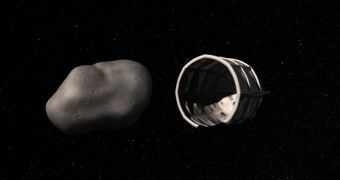Google co-founder Larry Page and renowned director James Cameron are among the investors in a newly-unveiled company, called Planetary Resources Inc. The purpose of this startup is to use advanced technologies to create spacecraft capable of mining asteroids.
Water and precious metals will be the main targets of these mining efforts, which will primarily be conducted on near-Earth asteroids. The company will make high profits by selling the raw materials it accumulates on the planetary markets.
At the same time, these mining outposts will act as support points for space exploration. They could become pit stops and resupply points for spacecraft heading further out into the solar system. In fact, these installations could help humankind become a multi-planetary species.
During a news conference to be held today at 1:30 pm EDT (1730 GMT), at the Museum of Flight in Seattle, officials with PRI are to unveil their plans for mining asteroids in more detail. Co-founder and co-chairman Eric Anderson said that platinum-group metals and water were the main targets.
“If you look at space resources, the logical next step is to go to the near-Earth asteroids. They're just so valuable, and so easy to reach energetically. Near-Earth asteroids really are the low-hanging fruit of the solar system,” the official told Space.
Platinum-group metals include ruthenium, rhodium, palladium, osmium, iridium, and platinum itself. They are only found in scarce supply on our planet, and are very difficult to mine most of the time.
Geologists say that these chemicals are not native to Earth. Most of them were inserted into the planet's crust during the Late Heavy Bombardment, a period billions of years ago when massive numbers of asteroids and comets struck all rocky planets in the inner solar system.
“We're going to go to the source. The platinum-group metals are many orders of magnitude easier to access in the high-concentration platinum asteroids than they are in the Earth's crust,” Anderson said.
He added that a 1,650-foot (500-meter) wide, platinum-rich asteroid can produce the equivalent of all platinum-group chemicals mined on Earth since the beginning of time. Such an abundance of elements will significantly decrease prices here on Earth.
“When the availability of these metals increase[s], the cost will reduce on everything including defibrillators, hand-held devices, TV and computer monitors, catalysts," PRI co-founder and co-chairman Peter Diamandis added.
“And with the abundance of these metals, we’ll be able to use them in mass production, like in automotive fuel cells,” he concluded.

 14 DAY TRIAL //
14 DAY TRIAL //